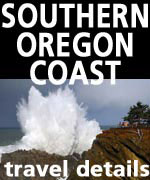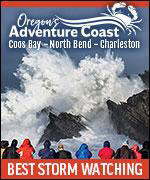Can You Swim in the Pacific Ocean on the Oregon Coast?
Published 11/04/2013
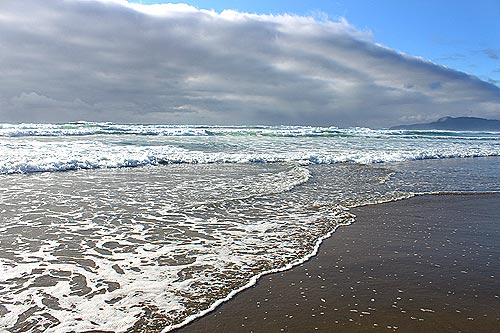
(Oregon Coast) – A question often asked by visitors to this shoreline is: “can I swim on the Oregon coast?” (Photo above: Rockaway Beach)
While there is no real official stand on this by Oregon tourism or state authorities, the general answer is: yes, you can swim in the Oregon coast's Pacific Ocean. Sort of.
However, that does not mean you should - just because you can. Almost every year there's a news story or two about someone having to be rescued by the U.S. Coast Guard in some failed attempt at taking a little swim.
Surfers do it all the time, of course, but they're well trained in what they do and they have their surfboards as a flotation device. Cold waters, rough conditions, and deadly rip currents are just part of the reason you really, really should not try to swim in the Pacific off the Oregon coast.
The ocean on this coast is always freezing cold: always about 55 degrees or so. Sometimes much colder in winter. In the summer the ocean rarely gets above 58 degrees. So even on the hottest of days in resort hotposts like Newport, Lincoln City, Seaside or Cannon Beach, this is not something you want to do. Surfers, of course, have highly insulated wet suits.
Even in the summer, wave conditions can be somewhat wild. This makes just getting into the Pacific Ocean a problem. Even with a wet suit you're a little doomed to just bob around fighting the breakers. During spring or winter – forget it. It doesn't take much for the ocean around here to get a little too chaotic for a human to endure.
Sandy beaches can be precarious enough for beachcombers with the sneaker wave possibilities in rougher conditions. These can pose big dangers to swimmers as well, even in simple nice weather. The Oregon coast is also known for its many rocky areas, like Depoe Bay, Pacific City or Yachats. These are obviously out of the question to even attempt jumping into, unless your idea of a good time is getting smacked against sharp, jagged rocks.
Debris floating in these rather rambunctious waves is also a serious issue. Logs and large chunks of litter or even rocks getting hidden beneath these white, frothy and rather tall waves, which means you won't see them coming. It's not just your head they could smack into: they could mess with a rib cage or disable your leg by lurking underneath the water's surface.
The worst issue, however, is saved for last. Rip currents are a nasty little habit that waters of the Oregon coast have of sucking you out to sea. It's a kind of ocean current in reverse – so strong that it's just not possible to fight it. They happen in various spots, and this can shift. It's not like there are known rip currents on certain beaches.
State of Oregon officials warn these can sweep beachcombers off their feet as well.
According to Oregon Park and Recreation's website, there are things to look for:
“Rip currents may appear as dark, choppy water. Any time you see debris and foam floating out to sea, chances are you have found a rip current. Avoid the area.”
State officials warn you to keep a watch on children on the beach and keep them close.
“If caught in a rip current, don't panic,” officials say. “Swim parallel to the beach until you are out of the current, then head for the beach.”Oregon Coast Lodging in this area - Where to eat - Maps - Virtual Tours
Also, even wading hip-deep in the ocean is not always a good idea. Sink holes can be present beneath the waves and these can trap you and drown you. Also – again – unseen debris like logs can lurk in the waves and injury you. There is plenty to do and see on these exceptionally pristine beaches without taking your life into your hands.
More Oregon coast beach safety is here. Photos below: Gleneden Beach, Lincoln City, Cannon Beach.
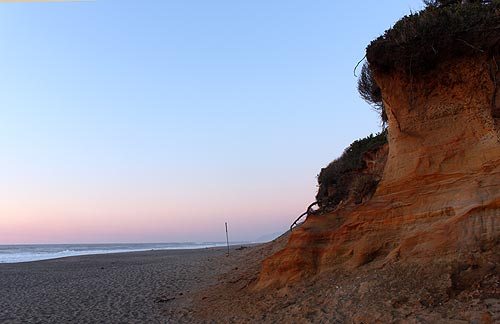
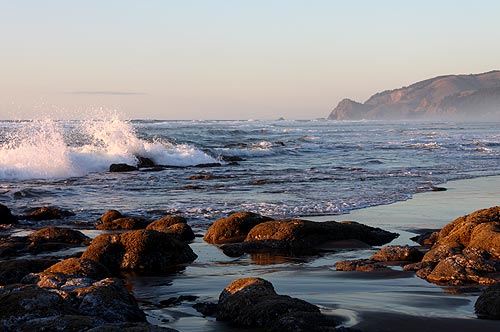
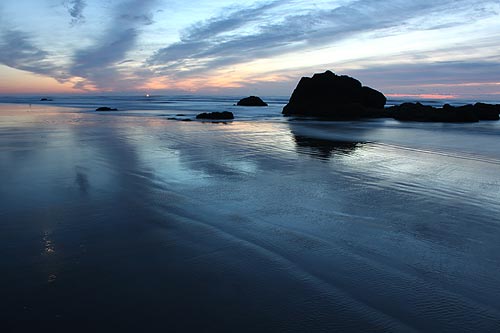
More About Oregon Coast hotels, lodging.....
More About Oregon Coast Restaurants, Dining.....
LATEST Related Oregon Coast Articles
A new roadway arose with more sunken asphalt. Traffic
Waves 17 to 26 Ft Along Oregon Coast: Surf Advisories, Sneaker Waves
A good show from Washington southward but some deadly possibilities. Weather
Two Videos Show Different Angles on Near-Deadly Oregon Coast Wave
The incident from 2021 just surfaced, showing a wave knocking people around Cape Kiwanda. Weather. Safety
Oregon Coast Town Looks at Possibility of Life Out There with Yachats Event
Jan 11 at the Yachats Commons examines the moon Europa. Yachats events
Oregon Coast and Washington Coast Beach Safety - the Complete Guide, Alerts, ...
Advice and guidelines for Washington and Oregon: what to look out for
Comet 31/Atlas Caught By Portland, Oregon Man On Its Way Out
Snapped by a Portlander as it zips out of the solar system. Astronomy, sciences
Newport Police Investigate Two Stabbings and a Shooting Near Oregon Coast's H...
A man was shot as he was allegedly stabbing his second victim
Flood Advisories, Warnings, Watches All Over Washington / Oregon Coast
Advisories, watches and warnings in various areas except the central Oregon coast. Weather, traffic
Back to Oregon Coast
Contact Advertise on BeachConnection.net
All Content, unless otherwise attributed, copyright BeachConnection.net Unauthorized use or publication is not permitted








